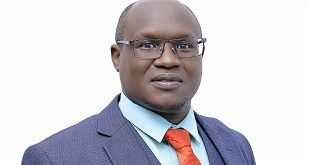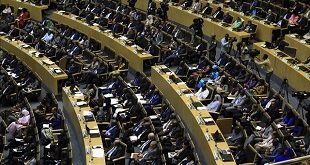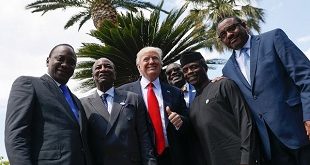The regional certification commission’s decision came after an exhaustive, decades-long process of documentation and analysis of polio surveillance, immunization and laboratory capacity of the region’s 47 member states, which included conducting field verification visits to each country.
The milestone also came four years after Nigeria – the last polio-endemic country in Africa – recorded its final case of wild poliovirus following decades of effort from the Global Polio Eradication Initiative (GPEI) partners, local and national leaders, and health workers throughout the African region.
GPEI, a public-private global partnership comprising national governments; WHO; Rotary International; the United States Centers for Disease Control and Prevention; UNICEF; the Bill & Melinda Gates Foundation; Gavi and the Vaccine Alliance invested nearly US$890 million to buy close to nine billion doses of the oral vaccine. These were then administered to “hundreds of millions of children.” As a result, 1.8 million cases of wild poliovirus were averted throughout the Africa region.
“In the face of a pandemic, the world has had very little good news to celebrate in global health this year, and the challenges ahead are formidable,” said Rotary International President Holger Knaack.
“That is why we must recognize this great achievement and commend all of the people who played important roles in eradicating wild polio in the African region. It took tremendous effort and partnership over many years. I’m particularly grateful for the Rotary members throughout Africa and around the world who have dedicated themselves to making polio a disease of the past.”
Knaack said the road to the African region’s wild poliovirus-free certification had been paved by the dedication of health workers—mainly women—who traveled by every form of transportation imaginable to reach children with the polio vaccine; those who found solutions for reaching children in regions rife with conflict and insecurity; those leading surveillance activities to test cases of paralysis and check sewage for the virus, and the leadership of all 47 countries in the African region.
“We have been painstakingly working toward this day since 1996, when Rotary and its GPEI partners first joined with Nelson Mandela to mobilize leaders across the continent to commit to reaching every child with the polio vaccine,” said Dr. Tunji Funsho, chair of Rotary’s Nigeria National PolioPlus Committee, “We still have important work to do, but this achievement shows that with collaboration, and political and financial support, the global eradication of polio is possible.”
In 1996, African Heads of State committed to eradicate polio during the 32nd ordinary Session of the Organization of African Unity (now African Union) in Yaoundé, Cameroon. At the time, polio was paralysing an estimated 75,000 children, annually, on the African continent.
In the same year, Nelson Mandela, the late president of South Africa, with the support of Rotary International jump-started Africa’s commitment to polio eradication with the launch of the “Kick Polio out of Africa” campaign. Mandela’s call mobilized African nations and leaders across the continent to step up their efforts to reach every child with polio vaccine.
Since 1996, polio eradication efforts have prevented up to 1.8 million children from crippling life-long paralysis and saved approximately 180,000 lives. The last case of wild poliovirus in the region was detected in 2016 in Nigeria.
However, while the eradication of wild poliovirus from the WHO African region is a major achievement, 16 countries in the region are currently experiencing vaccine-derived polio (cVDPV2) outbreaks, which can occur in under-immunized communities.
“Africa has demonstrated that despite weak health systems, significant logistical and operational challenges across the continent, African countries have collaborated very effectively in eradicating wild polio virus,” said Dr Pascal Mkanda, coordinator of WHO Polio Eradication Programme in the African Region.
“With the innovations and expertise that the polio programme has established, I am confident that we can sustain the gains, post-certification, and eliminate cVDPV2,” added Dr Mkanda.
“The expertise gained from polio eradication will continue to assist the African region in tackling COVID-19 and other health problems that have plagued the continent for so many years and ultimately move the continent toward universal health coverage. This will be the true legacy of polio eradication in Africa,” said Dr Moeti.
Now, only the vaccine-derived poliovirus remains in Africa with 177 cases being identified this year. This is a rare form of the virus that mutates from the oral polio vaccine and can then spread to under-immunized communities.
A number of these cases have been identified in Nigeria, the Democratic Republic of Congo and Angola. One in 200 infections leads to irreversible paralysis. Among those paralyzed, 5-10% of people die when their breathing muscles become immobilized.
Polio can also be easily imported into a country that is polio free and from there it can spread rapidly among under-immunized populations.
This happened in Angola, which despite decades of civil war, defeated polio in 2001. The country remained free from polio for four years until 2005 when a number of cases were thought to have been brought in from outside the country. The WHO says it is important countries remain vigilant and avoid complacency until there is global eradication.
For all types of polio to be eliminated including vaccine-derived polio, health experts say, vaccination efforts will need to continue alongside surveillance, to protect children from being paralyzed by the disease in future.
Keep vigilant
Dr Moeti said African governments must stay vigilant and keep up vaccination rates to avert a resurgence of the wild poliovirus and address the continued threat of the vaccine-derived polio.
Dr. Driwale told The Independent that Uganda will continue with its routine immunization campaigns because even if the risk may be less right now, there are countries that still have this virus. Pakistan and Afghanistan are the only two countries in the world that are yet to eradicate the disease. These two still pose a risk for countries like Uganda, considering the way the world is interconnected today, Dr. Driwale said.
“Until the World Health Organization (WHO) has declared the wild poliovirus eradicated from the surface of the earth, we will continue being vigilant.”
“We will continue with our surveillance, looking out for any possible cases of polio in the communities,” he said,“The Ministry of Health will take interest and carry out investigations on any child who develops paralysis from the communities.”
****
 The Independent Uganda: You get the Truth we Pay the Price
The Independent Uganda: You get the Truth we Pay the Price



NEW JOB OPENING IN 🇨🇦
DUBAI AND CANADA 🇨🇦
Drop your whatsApp number
+12045146622